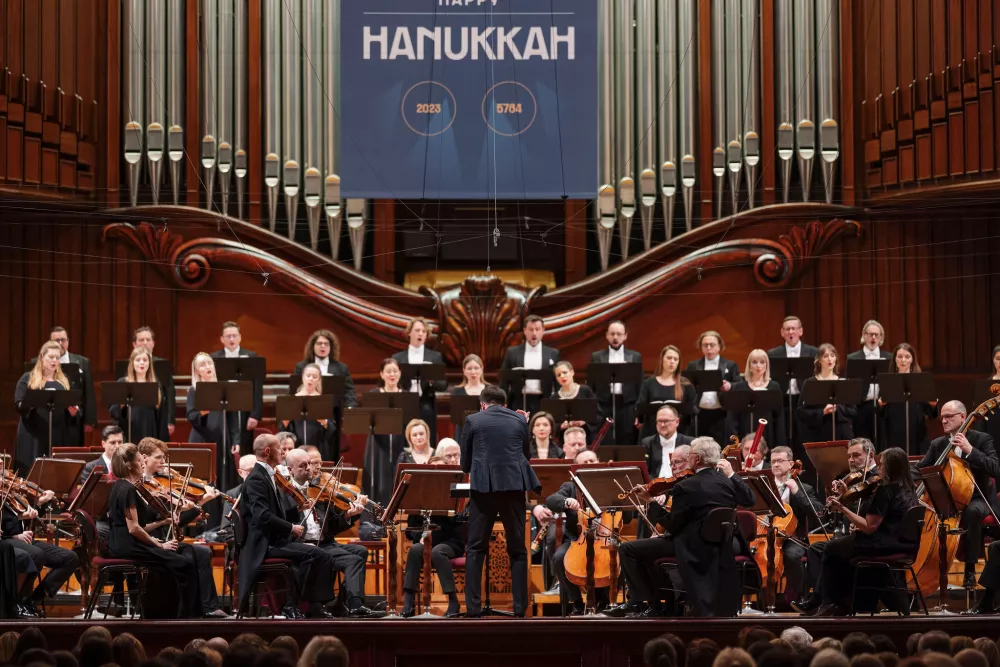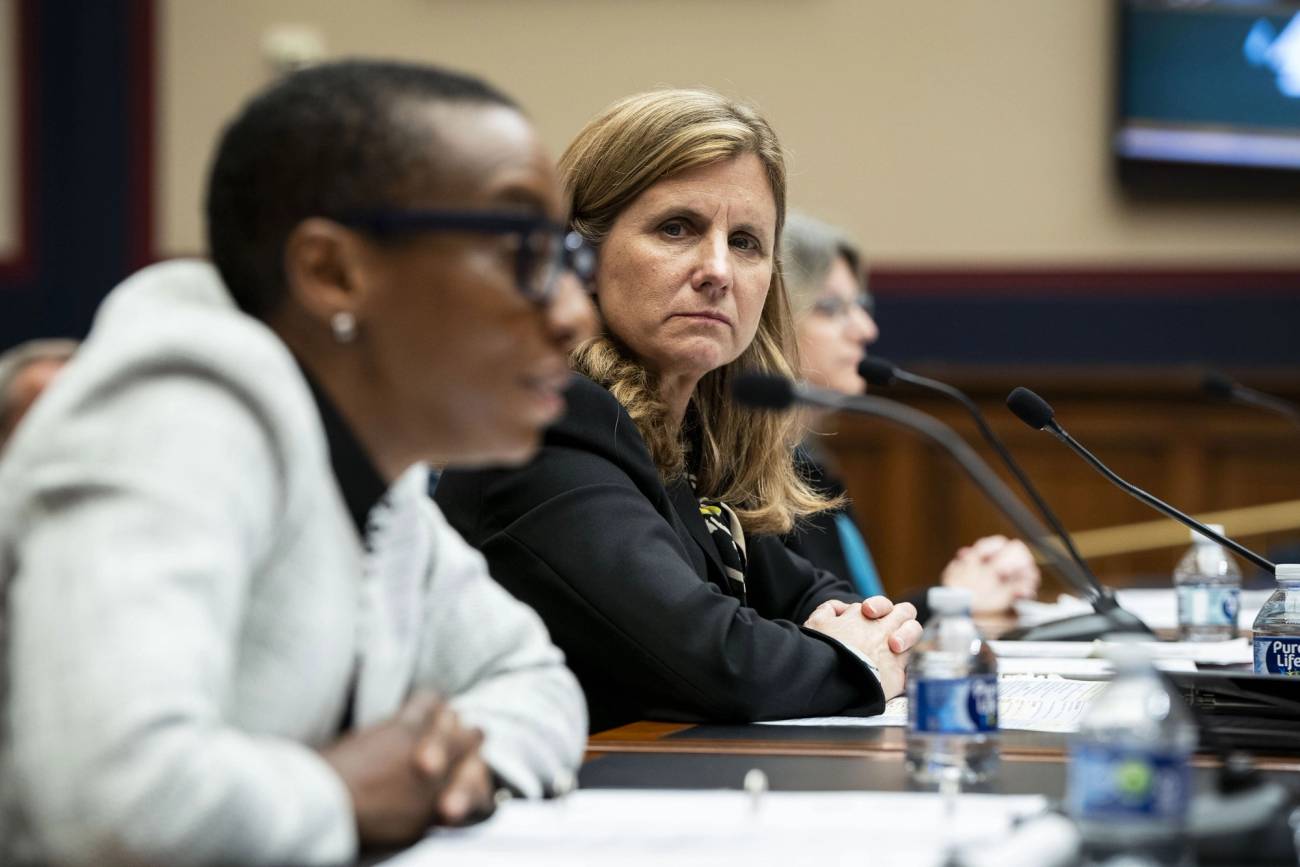
 Chanuka pełna światła. Uroczysty koncert chanukowy 2023/5784
Chanuka pełna światła. Uroczysty koncert chanukowy 2023/5784
Natasza Majewska
7 grudnia już po raz trzeci spotkaliśmy się w Filharmonii Narodowej, by uroczystym koncertem świętować Chanukę i zakończenie kolejnego roku intensywnej pracy Żydowskiego Instytutu Historycznego.
.
 fot. Andrzej Stawiński
fot. Andrzej Stawiński
W tegorocznym programie znalazło się niezwykle efektowne oratorium Juda Machabeusz Georga Friedricha Händela w wykonaniu Orkiestry i Chóru Filharmonii Narodowej pod dyrekcją Macieja Tomasiewicza. Partie solowe zaśpiewali Aneta Kapla-Marszałek (sopran), Anna Krawczuk (alt) i Krzysztof Matuszak (bas). Uroczystość jak co roku poprowadził Andrzej Sułek.
– Chanuka to radosne święto, podczas którego wspominamy wyzwolenie Izraela spod władzy Greków – rozpoczęła od przybliżenia historii święta dyrektorka ŻIH Monika Krawczyk. – Na pamiątkę tego wydarzenia sprzed prawie 2200 lat Żydzi przez osiem dni po zmroku zapalają świeczki chanukowe – każdego dnia o jedną więcej. Śpiewają przy tym pieśń Maoz cur, hymn na cześć Boga, odmawiają błogosławieństwa i cieszą się ze zwycięstwa światła nad ciemnością, tak fizyczną, jak i duchową. Życzę Państwu Bożego błogosławieństwa z okazji wszystkich nadchodzących świąt i Chanuki pełnej światła. Niech blask świec chanukowych połączy nas dzisiaj we wspólnym przeżywaniu tej radości i zachęci do budowania więzi i dobrych relacji. Wesołych i pogodnych świąt!
Pierwszą świecę na tegorocznej chanukii zapalił rabin Szalom Dow Ber Stambler.
– Słowo „Chanuka” to jest z rdzenia hebrajskiego słowa chinuch: edukacja i wychowanie – mówił. – To święto jest piękną okazją dla każdego dobra. Każdy rodzic, każdy nauczyciel powinien upewnić się, że dzieci wokół niego mają dobrą edukację. Że mają atmosferę, mają warunki i mają jasne wartości co do praw człowieka, co do wzajemnego szacunku. Dzisiaj zapalimy jedną świecę, ale jutro to już nie wystarczy i będą dwie świece, i trzy świece – bo jeśli chodzi o dobre rzeczy, to to, co było wczoraj wystarczające, dzisiaj już nie jest wystarczające i trzeba dodać i dodać – aż do liczby osiem, która jest symbolem nieskończoności.
– A więc świętujmy teraz Chanukę, to święto światła, żebyśmy zawsze pamiętali różnicę między złem a dobrem i wspierali dobro – zakończył część oficjalną ambasador Izraela Yacov Livne.
Po zapaleniu świecy i poznaniu fascynującej historii powstania oratorium Juda Machabeusz, którą przedstawił nam Andrzej Sułek, mogliśmy wsłuchać się w tę muzyczną opowieść o zwycięstwie, które co roku świętujemy. Dziękujemy za to wspólne świętowanie i jeszcze raz życzymy Państwu jak najwięcej dobra i światła – aż do nieskończoności.
Partnerami koncertu było Muzeum Getta Warszawskiego i Towarzystwo Społeczno-Kulturalne Żydów w Polsce.
Organizator:
![Instytucja organizowana przez.png [138.45 KB]](https://www.jhi.pl/storage/image/core_files/2023/12/8/df4ca00128e4bdbc0f692d506aa5a780/png/jhi/preview/Instytucja%20organizowana%20przez.png)
Partnerzy:
![MGW_logo_PL_czerwone.png [55.88 KB]](https://www.jhi.pl/storage/image/core_files/2021/11/30/fd1217b1d0c1cee8561fe294fcd0ae8a/png/jhi/preview/MGW_logo_PL_czerwone.png)
![tskz_logo_2021.jpg [576.38 KB]](https://www.jhi.pl/storage/image/core_files/2021/11/30/183cfd80debe0332763fc255282eb3e6/jpg/jhi/preview/tskz_logo_2021.jpg)
Zawartość publikowanych artykułów i materiałów nie reprezentuje poglądów ani opinii Reunion’68,
ani też webmastera Blogu Reunion’68, chyba ze jest to wyraźnie zaznaczone.
Twoje uwagi, linki, własne artykuły lub wiadomości prześlij na adres:
webmaster@reunion68.com

.jpg)
.jpg)
.jpg)
.jpg)
.jpg)
.jpg)
.jpg)
.jpg)
.jpg)
.jpg)
.jpg)
.jpg)
.jpg)
.jpg)
.jpg)
.jpg)
.jpg)
.jpg)
.jpg)
.jpg)
.jpg)
.jpg)
.jpg)
.jpg)
.jpg)
.jpg)
.jpg)
.jpg)
.jpg)
.jpg)
.jpg)
.jpg)
.jpg)
.jpg)
.jpg)
.jpg)




